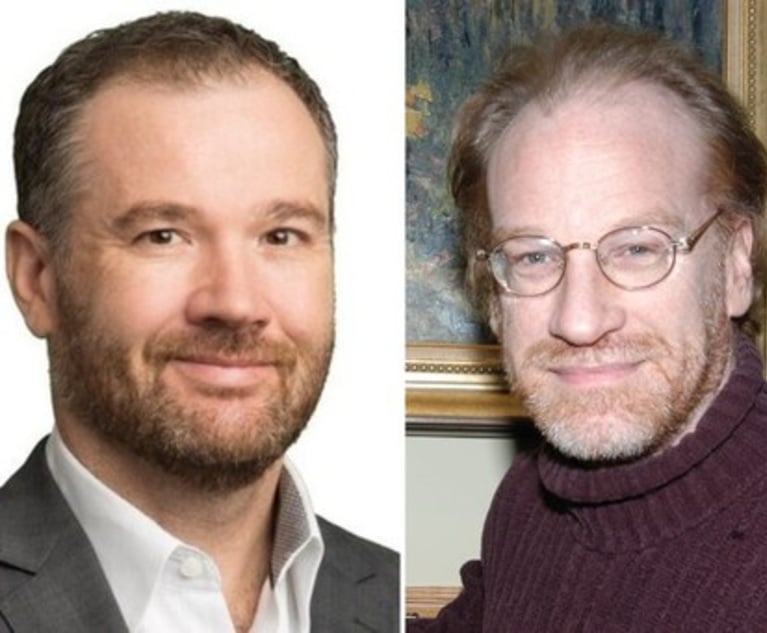Linklaters joins new project to define future of smart contracts
Firm joins Dentons and DLA Piper on working group aiming to set standards for financial-based smart contracts
February 28, 2018 at 10:57 AM
3 minute read
The original version of this story was published on Legal Tech News

Linklaters has signed up to a new initiative aiming to bring together a consortium of legal and technology partners to help promote open standards around smart contracts.
Richard Hay, the UK head of fintech at Linklaters, said the firm was eager to join the initiative – dubbed the Accord Project – because it is looking to "instil in our lawyers a sense that this is a time of significant technological advance, and that some aspects of contracts that are currently written in prose may ultimately be written in some form of machine-readable text".
He added: "We are looking to empower our lawyers to make the most of these technologies and the technological advances that they entail."
Linklaters has been involved in smart contract and blockchain-related endeavours prior to joining the Accord Project. The firm recently issued a joint white paper with the International Swaps and Derivatives Association, exploring the use of blockchain-enabled contracts for derivative-based financial transactions.
Linklaters has also run "a number coding workshops for lawyers" that educate its own lawyers about smart contracts and blockchain-enabled automation, Hay said.
The firm will join the Accord Project as a member of its financial services working group, where it will help define standards for smart contracts in the financial industry. Hay noted that the during the past "two or three years, we have seen most interest in blockchain and smart contracts" come from the financial sector, and that interest is now "spilling over into our broader corporate client base".
The Accord Project was founded by Dentons-backed internet of things-enabled contract startup Clause, and already has a host of other law firm partners including Dentons, Holland & Knight, DLA Piper, and BakerHostetler.
The project also counts tech organisations such as Hyperledger, the International Association for Contract & Commercial Management and, more recently, the Open Identity Exchange, as partners as well.
Peter Hunn, CEO of Clause, previously told Legaltech News that the goal of the Accord Project is "to start setting some standards around what the technology will look like, so that law firms and other users can become acquainted with it".
Houman Shadab, co-founder of Clause, previously told Legaltech News that although the term "smart contracts" is often linked to blockchain, the Accord Project will aim to take a much broader view of what such contracts can entail.
"Definitely there is a need to consolidate what we mean by smart contracts and bring it back under the rubric of legally enforceable and automated technology. That may or may not be implemented with a blockchain," he noted.
Indeed, smart contracts may not entail fully automated contracts. Hay noted that though "most financial contracts have clauses that at the moment would be more susceptible to being automated", there is still a fair amount of clauses that do not lend themselves well to automation.
While the "the holy grail is ultimately" a fully automated contract, Hay said it is far more realistic at this time to consider automation in a piecemeal fashion.
This content has been archived. It is available through our partners, LexisNexis® and Bloomberg Law.
To view this content, please continue to their sites.
Not a Lexis Subscriber?
Subscribe Now
Not a Bloomberg Law Subscriber?
Subscribe Now
NOT FOR REPRINT
© 2025 ALM Global, LLC, All Rights Reserved. Request academic re-use from www.copyright.com. All other uses, submit a request to [email protected]. For more information visit Asset & Logo Licensing.
You Might Like
View All
African Law Firm Under Investigation Over ‘AI-Generated’ Case References
3 minute read

When Inadvertent Disclosures Happen at a Law Firm, Who Is Responsible?

Canadians Mourn the Loss of Two Esteemed Legal Professionals: Alan Young and Jason Moyse
4 minute readTrending Stories
- 1Decision of the Day: Judge Dismisses Defamation Suit by New York Philharmonic Oboist Accused of Sexual Misconduct
- 2California Court Denies Apple's Motion to Strike Allegations in Gender Bias Class Action
- 3US DOJ Threatens to Prosecute Local Officials Who Don't Aid Immigration Enforcement
- 4Kirkland Is Entering a New Market. Will Its Rates Get a Warm Welcome?
- 5African Law Firm Investigated Over ‘AI-Generated’ Case References
Who Got The Work
J. Brugh Lower of Gibbons has entered an appearance for industrial equipment supplier Devco Corporation in a pending trademark infringement lawsuit. The suit, accusing the defendant of selling knock-off Graco products, was filed Dec. 18 in New Jersey District Court by Rivkin Radler on behalf of Graco Inc. and Graco Minnesota. The case, assigned to U.S. District Judge Zahid N. Quraishi, is 3:24-cv-11294, Graco Inc. et al v. Devco Corporation.
Who Got The Work
Rebecca Maller-Stein and Kent A. Yalowitz of Arnold & Porter Kaye Scholer have entered their appearances for Hanaco Venture Capital and its executives, Lior Prosor and David Frankel, in a pending securities lawsuit. The action, filed on Dec. 24 in New York Southern District Court by Zell, Aron & Co. on behalf of Goldeneye Advisors, accuses the defendants of negligently and fraudulently managing the plaintiff's $1 million investment. The case, assigned to U.S. District Judge Vernon S. Broderick, is 1:24-cv-09918, Goldeneye Advisors, LLC v. Hanaco Venture Capital, Ltd. et al.
Who Got The Work
Attorneys from A&O Shearman has stepped in as defense counsel for Toronto-Dominion Bank and other defendants in a pending securities class action. The suit, filed Dec. 11 in New York Southern District Court by Bleichmar Fonti & Auld, accuses the defendants of concealing the bank's 'pervasive' deficiencies in regards to its compliance with the Bank Secrecy Act and the quality of its anti-money laundering controls. The case, assigned to U.S. District Judge Arun Subramanian, is 1:24-cv-09445, Gonzalez v. The Toronto-Dominion Bank et al.
Who Got The Work
Crown Castle International, a Pennsylvania company providing shared communications infrastructure, has turned to Luke D. Wolf of Gordon Rees Scully Mansukhani to fend off a pending breach-of-contract lawsuit. The court action, filed Nov. 25 in Michigan Eastern District Court by Hooper Hathaway PC on behalf of The Town Residences LLC, accuses Crown Castle of failing to transfer approximately $30,000 in utility payments from T-Mobile in breach of a roof-top lease and assignment agreement. The case, assigned to U.S. District Judge Susan K. Declercq, is 2:24-cv-13131, The Town Residences LLC v. T-Mobile US, Inc. et al.
Who Got The Work
Wilfred P. Coronato and Daniel M. Schwartz of McCarter & English have stepped in as defense counsel to Electrolux Home Products Inc. in a pending product liability lawsuit. The court action, filed Nov. 26 in New York Eastern District Court by Poulos Lopiccolo PC and Nagel Rice LLP on behalf of David Stern, alleges that the defendant's refrigerators’ drawers and shelving repeatedly break and fall apart within months after purchase. The case, assigned to U.S. District Judge Joan M. Azrack, is 2:24-cv-08204, Stern v. Electrolux Home Products, Inc.
Featured Firms
Law Offices of Gary Martin Hays & Associates, P.C.
(470) 294-1674
Law Offices of Mark E. Salomone
(857) 444-6468
Smith & Hassler
(713) 739-1250








